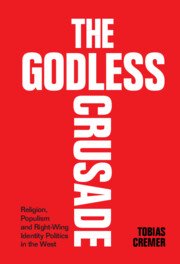“Let me say clearly now to Christians that they should not be associated with any far-right group – because those groups are unchristian. Let me say clearly now to other faiths, especially Muslims, that we denounce people misusing such imagery as fundamentally antichristian.”
Justin Welby, Archbishop of Canterbury, in The Guardian 11th of August, 2024.
In the aftermath of the UK riots during this summer, the Church of England Archbishop was crystal clear in his denouncement of far-right groups. According to Welby, these populists might claim to be Christian, but they are not.
Following the argument of Tobias Cremer in his book The Godless Crusade: Religion, Populism and Right-Wing Identity Politics in the West (2023), the Archbishop did the right thing. In his well-written, well-structured book, Cremer examines three cases, three Western democracies with Judeo-Christian heritage that have undergone the societal changes in question and have seen the rise of right-wing populism: Germany, France, and the US. In particular, Cremer is interested in their different responses to right-wing populism. Based on an impressive number of interviews (114!) with politicians and religious leaders, Cremer develops a fourfold argument:
- What we are witnessing when populists refer to religion is not “the return of religion” in society, but rather the effects of societal changes such as individualization, secularization, and migration, and the erosion of traditional ways of describing collective identity. In Western societies characterized by pluralism, secularization, and migration, the traditional narratives of collective identity (e.g., religion, class, liberalism/Marxism) are no longer meaningful. Cremer outlines two approaches to address this, where the divide lies between “cosmopolitans” who speak of the tension between the global and the individual, diversity, multiculturalism, and the significance of minorities, and “communitarians,” who seek collective identities with clear markers such as ethnicity, culture, history, institutions, and language. According to Cremer, right-wing populists capitalize on this divide, attempting to attract communitarians by offering a clear-cut group identity.
- To construct this collective identity, right-wing populists use religion (Cremer defines “religion” as the empirical expression of Christianity, such as political and social interaction, and other things that could be measured like religious affiliation, church attendance, private religious actions such as prayer and so on) as a secularized cultural identity marker to form this group identity. Cremer discusses this in terms of supply and demand: the societal changes have created a demand for narratives of identity that two sources of supply can meet: political (political parties – ordinary and populist – journalists, political institutions) and religious (church institutions, religious leaders, religious orders, and organizations).
- However, the populists are often distanced from “Christianity”, i.e., Christian values, and doctrines, as they are formulated by the main Christian institutions in each country. Here, Cremer relies on analyses of already existing quantitative data and studies to show how voting patterns and political attitudes correlate with things like church membership and church attendance. According to Cremer, practicing Christians in the US tend to support populists to a higher degree than their European counterparts. In other words, there seems to be a certain “immunity” toward appeals from right-wing populism among practicing Christians compared to non-religious or cultural Christians.
- Finally, Cremer argues that this immunity to right-wing populism is sustained by two factors: 1) a distinct “Christian” alternative in the political landscape and 2) the public rejection of right-wing populism by religious leaders, creating a social taboo against engaging with them.
In the light of Cremer’s argument, the CofE Archbishop’s strong denouncement of far right-wing groups as “unchristian” could be seen as part of a vaccination program against populism’s Godless crusade. However, when I read Cremer’s argument (and the Archbishop’s statement) through the lenses of the discussions I am involved in as a practical theologian and part of the Scripture and secularism project, I can’t help but wonder: is there really such a thing as an entirely Godless crusade?
In the last decades of practical-theological discussion, the concept of “lived theology” has become an important resource to describe and understand the practices of churches and individuals (for an overview of the concept in Swedish, see the afterword by Teresia Derlén and Frida Mannerfelt in the book Som spridda sädeskornen: perspektiv på nattvardens levda teologi (2024)). In this point of view, theology is not just formulated in normative church documents or the books of trained theologians, but also in church communities, the ordinary lives of individuals, and public discourse. In her recent book Lived Theology: Impulses for a Pastoral Theology of Empowerment (2021), practical theologian Sabrina Müller gives the following definition: ”lived theology is grounded in the world of experience and life reality of human beings. It becomes theology when it is expressed with reflection and resonates in the public sphere” (Müller 2021, s. 31).
From this point of view, the populists’ use of religion – as flawed and banal as it might be – could be understood as a form of lived theology in the public space. Just like the series of European crusades against the religious others in Jerusalem that started in the 10th Century were underpinned by theology, so are the populist “crusades” of the 21st Century.
Understanding the populists’ view as a “theology” might also be crucial. In their book The Claim to Christianity: Responding to the Far Right (2020), Hannah Strömmen and Ulrich Schmiedel point out, that when you make the claim that Christianity has been hijacked by the far-right, and say that they do not present a theology, you lose the chance to give theological critique, and to present a theologically sound counter-option. In a worst-case scenario, the populists will be ignored altogether by theologians. If populism is not true Christianity, not theology, why should theologians engage with it?
With that said, I highly recommend reading both The Godless Crusade and the statement from the Archbishop, as they both have highly relevant things to say about scripture and secularism today.
